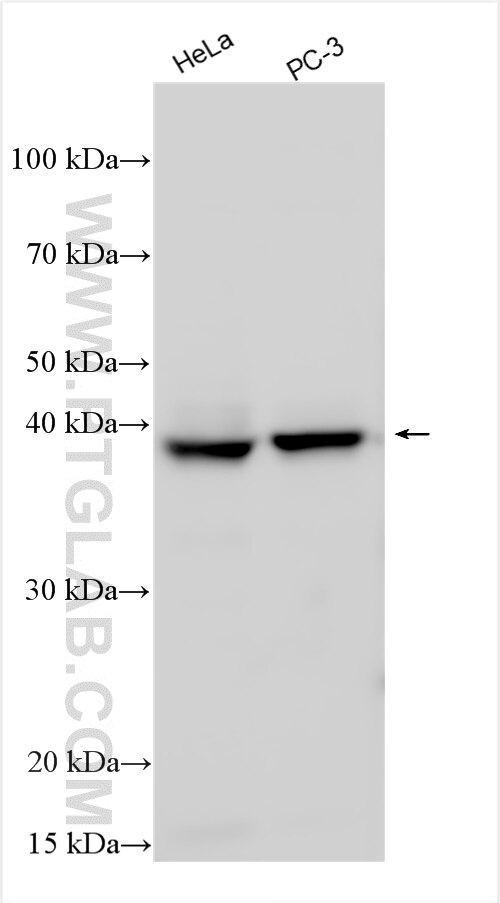SPOPL Polyklonaler Antikörper
SPOPL Polyklonal Antikörper für WB, ELISA
Wirt / Isotyp
Kaninchen / IgG
Getestete Reaktivität
human
Anwendung
WB, ELISA
Konjugation
Unkonjugiert
Kat-Nr. : 17740-1-AP
Synonyme
Geprüfte Anwendungen
| Erfolgreiche Detektion in WB | HeLa-Zellen, PC-3-Zellen |
Empfohlene Verdünnung
| Anwendung | Verdünnung |
|---|---|
| Western Blot (WB) | WB : 1:500-1:2000 |
| It is recommended that this reagent should be titrated in each testing system to obtain optimal results. | |
| Sample-dependent, check data in validation data gallery | |
Veröffentlichte Anwendungen
| WB | See 1 publications below |
Produktinformation
17740-1-AP bindet in WB, ELISA SPOPL und zeigt Reaktivität mit human
| Getestete Reaktivität | human |
| In Publikationen genannte Reaktivität | human |
| Wirt / Isotyp | Kaninchen / IgG |
| Klonalität | Polyklonal |
| Typ | Antikörper |
| Immunogen | SPOPL fusion protein Ag11951 |
| Vollständiger Name | speckle-type POZ protein-like |
| Berechnetes Molekulargewicht | 392 aa, 45 kDa |
| Beobachtetes Molekulargewicht | 39-45 kDa |
| GenBank-Zugangsnummer | BC071613 |
| Gene symbol | SPOPL |
| Gene ID (NCBI) | 339745 |
| Konjugation | Unkonjugiert |
| Form | Liquid |
| Reinigungsmethode | Antigen-Affinitätsreinigung |
| Lagerungspuffer | PBS with 0.02% sodium azide and 50% glycerol |
| Lagerungsbedingungen | Bei -20°C lagern. Nach dem Versand ein Jahr lang stabil Aliquotieren ist bei -20oC Lagerung nicht notwendig. 20ul Größen enthalten 0,1% BSA. |
Hintergrundinformationen
Speckle Type POZ Protein Like (SPOPL), a member of the MATH-BTB protein family, was frst identifed in 2010 with 82.6% sequence homology with Speckle-type POZ protein (SPOP). SPOPL is an E3 ubiquitin ligase protein that ubiquitinates and degrades the target protein. SPOPL can be used as a potential prognostic biomarker for glioblastoma multiforme in clinical work and promotes the proliferation and stemness of glioma stem cells by activating the Notch signaling pathway (PMID:37523046).
Protokolle
| PRODUKTSPEZIFISCHE PROTOKOLLE | |
|---|---|
| WB protocol for SPOPL antibody 17740-1-AP | Protokoll herunterladen |
| STANDARD-PROTOKOLLE | |
|---|---|
| Klicken Sie hier, um unsere Standardprotokolle anzuzeigen |


